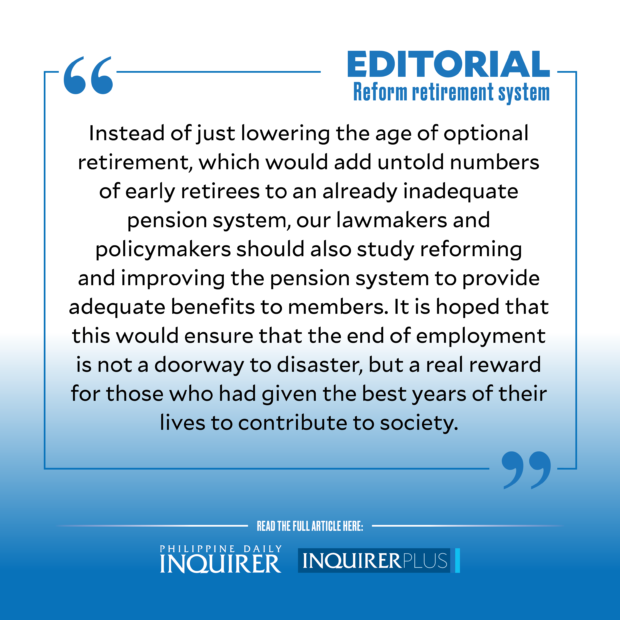By an overwhelming majority, congressional representatives voted this week to pass a bill lowering the optional retirement age for government employees from 60 to 56 years.
A House press release quoted Speaker Ferdinand Martin Romualdez’s optimistic take on the proposed measure: “They (government workers) can opt to quit working, receive their benefits, do other activities, and enjoy life in retirement with their loved ones even before they become senior citizens.”
Indeed, this is an attractive option. Who doesn’t want to stop working while one is still in relatively good health, and enjoy the company of family and friends, while drawing financial support from a state pension?
And yet, for many senior Filipinos, including the approximately one million Filipinos working in government who would be affected should the measure be signed into law, the reality of retirement actually, to use present-day slang, “bites.”
This is because, as a 2020 report in this paper points out, an estimated 80 percent of Filipinos nearing retirement age are financially unprepared to bear the cost of post-retirement life. Then Bangko Sentral ng Pilipinas Gov. (now Finance Secretary) Benjamin Diokno had bad news for those contemplating leaving the workforce. “The harsh reality,” he said, “is that eight out of 10 Filipinos aged 60 and above, and in many cases retirees, do not receive sufficient pension to fully cover their living expenses.”
Last year, Senior Citizens party list Rep. Rodolfo Ordanes Jr. proposed that beyond making retirement optional for those 56 years and older, the law could also allow employees who reach 65 years (the current compulsory retirement age) to “choose to continue their employment” provided that a senior citizen “qualified under the bona fide occupational qualifications of his job.”
Why do many senior citizens wish to continue working beyond retirement age? To begin with, said financial consultant Boom Rizal in a blog post, many seniors are still not entitled to government-mandated retirement benefits since “they’re not enrolled in either the Social Security System (SSS) for private sector employees, or the Government Social Insurance System (GSIS) because of their low income.” In 2016, only 29 percent of seniors were covered by the SSS or GSIS.
But even if they receive the mandated pension, the amount is still not enough to cover living expenses, including rising medical and health care costs. As of 2021, SSS pensions ranged from P1,200 to a little over P10,000, averaging about P3,600 a month, still inadequate by many measures. No wonder there was a public outcry against the plan (since rescinded) to draw on the funds of the SSS and GSIS to finance the Maharlika Investment Fund. Many argued that it would imperil the already precarious situation of retirees who feared seeing the money set aside for their pension frittered away in an untested instrument.
The country, in fact, ranks the second worst among 44 economies in terms of retirement income system, a deterioration from its previous years’ rankings in the Mercer CFA Institute Global Pension Index. Mercer cited the country’s system of “having no requirements in terms of communicating with plan members” as the primary cause for its very low scores.
It said unless the government addresses the “major weaknesses and/or omissions” in its retirement system, its efficacy and sustainability will continue to be in doubt and the country will remain among the worst places for retirees.
In passing the bill lowering the optional retirement age for government employees, House members seemed to view the measure as a way of rewarding workers for their many years spent in the workforce. Speaker Romualdez, for one, said retiring early would enhance the life of seniors. “It’s surely more fun to live life without work-related stress,” he asserted.
But the reality confronting many retirees is far from “fun.” For many, the end of employment is proving to be a reason for insecurity, anxiety, dependency, and, indeed, poverty. While retirement will be optional at 56, it can also be a double-edged sword for those who may have no choice but to continue working to provide for themselves and their families in these difficult times of high prices and lack of jobs.
Instead of just lowering the age of optional retirement, which would add untold numbers of early retirees to an already inadequate pension system, our lawmakers and policymakers should also study reforming and improving the pension system to provide adequate benefits to members. It is hoped that this would ensure that the end of employment is not a doorway to disaster, but a real reward for those who had given the best years of their lives to contribute to society.
